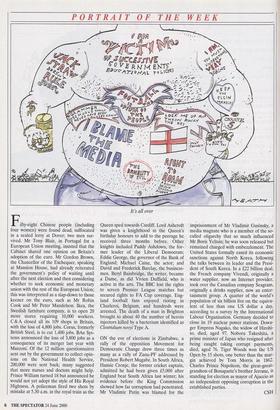PORTRAIT OF THE WEEK
It's all over Fifty-eight Chinese people (including four women) were found dead, suffocated in a sealed lorry at Dover; two men sur- vived. Mr Tony Blair, in Portugal for a European Union meeting, insisted that the Cabinet shared one opinion on Britain's adoption of the euro. Mr Gordon Brown, the Chancellor of the Exchequer, speaking at Mansion House, had already reiterated the government's policy of waiting until after the next election and then considering whether to seek economic and monetary union with the rest of the European Union; this was interpreted as a slap-down to those keener on the euro, such as Mr Robin Cook and Mr Peter Mandelson. Ikea, the Swedish furniture company, is to open 20 more stores requiring 10,000 workers. C &A closed all its 109 shops in Britain, with the loss of 4,800 jobs. Corus, formerly British Steel, is to cut 1,400 jobs. BAe Sys- tems announced the loss of 3,800 jobs as a consequence of its merger last year with Marconi. Of the 12 million questionnaires sent out by the government to collect opin- ions on the National Health Service, 200,000 were sent back; many suggested that more nurses and doctors might help. Prince William turned 18 but announced he would not yet adopt the style of His Royal Highness. A policeman fired two shots by mistake at 5.30 a.m. in the royal train as the Queen sped towards Cardiff. Lord Ashcroft was given a knighthood in the Queen's birthday honours to add to the peerage he received three months before. Other knights included Paddy Ashdown, the for- mer leader of the Liberal Democrats; Eddie George, the governor of the Bank of England; Michael Caine, the actor; and David and Frederick Barclay, the business- men. Beryl Bainbridge, the writer, became a Dame, as did Vivien Duffield, who is active in the arts. The BBC lost the rights to screen Premier League matches but secured rights to FA Cup coverage. Eng- land football fans enjoyed rioting in Charleroi, Belgium, and hundreds were arrested. The death of a man in Brighton brought to about 40 the number of heroin injectors killed by a bacterium identified as Clostridium novyi Type A.
ON the eve of elections in Zimbabwe, a rally of the opposition Movement for Democratic Change drew three times as many as a rally of Zanu-PF addressed by President Robert Mugabe. In South Africa, Hansie Cronje, the former cricket captain, admitted he had been given £5,000 after England beat South Africa last winter; his evidence before the King Commission showed how far corruption had penetrated. Mr Vladimir Putin was blamed for the imprisonment of Mr Vladimir Gusinsky, a media magnate who is a member of the so- called oligarchy that so much influenced Mr Boris Yeltsin; he was soon released but remained charged with embezzlement. The United States formally eased its economic sanctions against North Korea, following the talks between its leader and the Presi- dent of South Korea. In a £22 billion deal, the French company Vivendi, originally a water supplier, now an Internet provider, took over the Canadian company Seagram, originally a drinks supplier, now an enter- tainment group. A quarter of the world's population of six billion live on the equiva- lent of less than one US dollar a day, according to a survey by the International Labour Organisation. Germany decided to close its 19 nuclear power stations. Dowa- ger Empress Nagako, the widow of Hirohi- to, died, aged 97. Noboru Takeshita, a prime minister of Japan who resigned after being caught taking corrupt payments, died, aged 76. Tiger Woods won the US Open by 15 shots, one better than the mar- gin achieved by Tom Morris in 1862. Charles Prince Napoleon, the great-great- grandson of Bonaparte's brother Jerome, is standing for election as mayor of Ajaccio as an independent opposing corruption in the established parties. CSH


































































 Previous page
Previous page